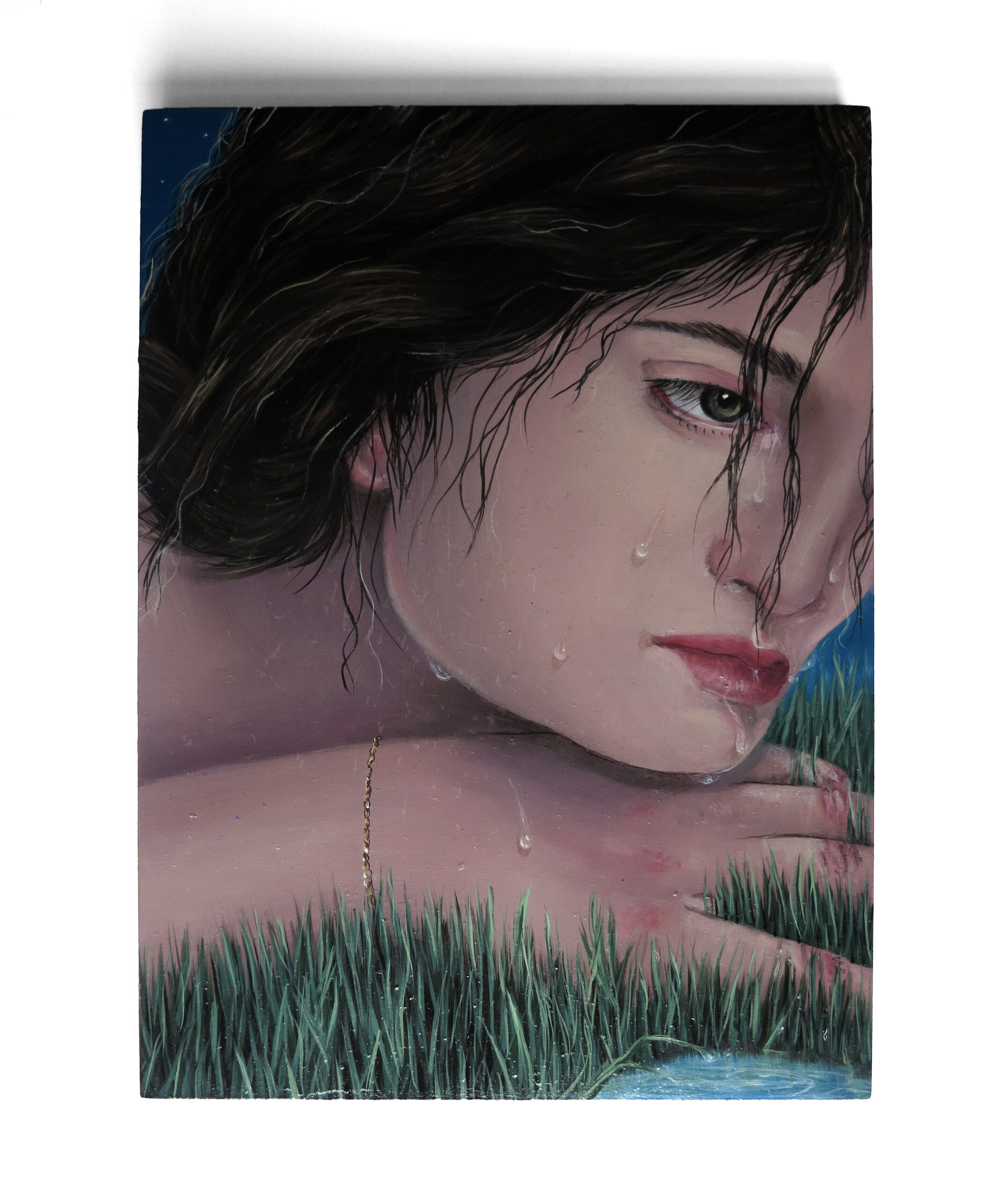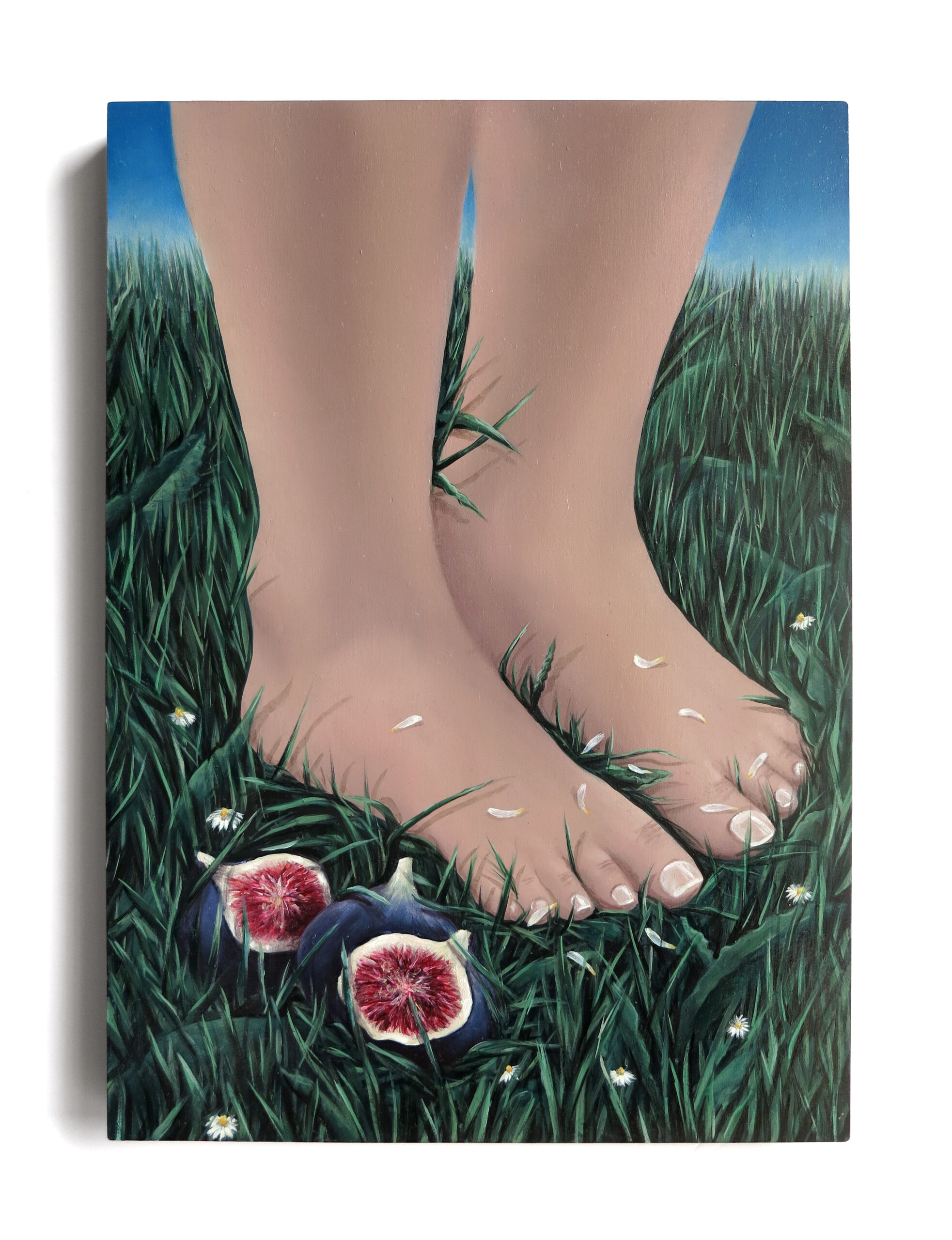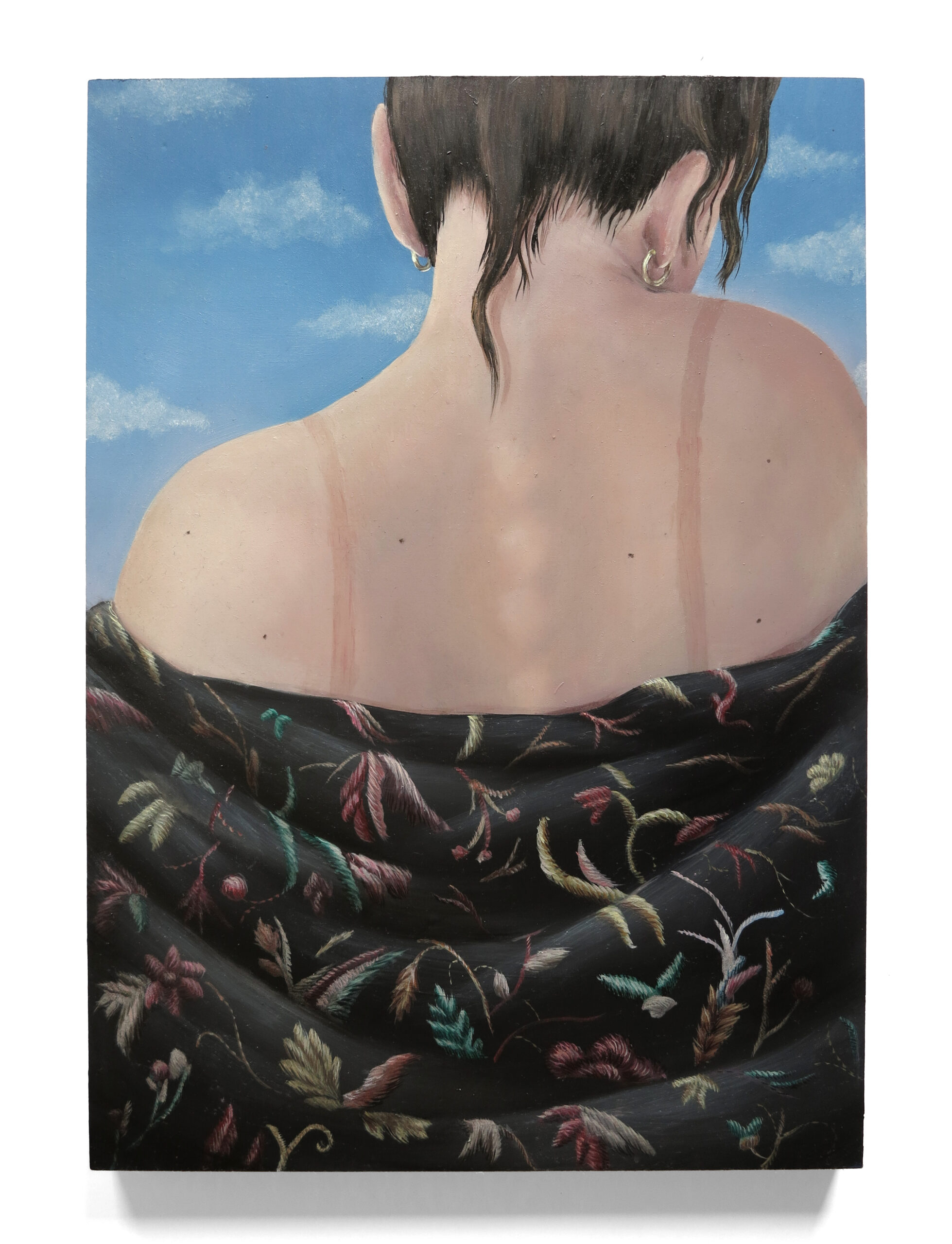Tracing Back
Natalia GONZÁLEZ MARTÍN
“During the pandemic, I was able to focus on my own research, which resulted in a new dimension to the painting series I am now working on.”
“在疫情期间,我得以机会全神贯注于个人的学术研究,这使我从范例中找到了一个从未出现的全新维度。”



Biography
Natalia is a Spanish artist focusing on adapting traditional techniques and formats from icon paintings. Through this, she explores the traces we have been left with from traditions that have prevailed over mainland Europe for centuries and their capacity to continue to exist through time. She is also the co-director of Subsidiary Projects, an artist-led space to promote the work of emerging artists.
Natalia 作为一位西班牙艺术家,其主要关注在标志性绘画作品中体现出的,对于经典绘画技法与构图范式的借鉴意义。此外,她试图以上述课题为手段,对曾于欧洲大陆盛行数个世纪的传统范式发展轨迹进行探索,并试图剖析出其能历经数百年的作用内核。同时,她还在位于伦敦,以“打造一个优化艺术家作品,并由艺术家主导的空间”为创立意图的Subsidiary Projects画廊担任联合主管。
Interview
The names would be abbreviated as “Isabel” (Isabel DIERINGER) and “Natalia” (Natalia GONZÁLEZ MARTÍN).
(之后姓名分别写为“Isabel”、“Natalia”)
Isabel: How did you organise your work and life during the pandemic?
Natalia: With the lockdown measures, many artists weren’t able to access their studios, which has translated into adapting our domestic spaces and consequently our practice, to create. In my case, the main difference is in the scale of the work, which has been reduced considerably to fit in my home studio.
Isabel:疫情期间,你是如何安排你的工作和生活的?
Natalia:采取锁定措施后,作为艺术家我们无法进入工作室,所以我们只能去适应在家创作。就我个人而言,主要的区别在于我作品的规模,为了适合在家创作,我的作品被大规模缩小了。
Isabel: What is different from before the pandemic?
Natalia: Before we could discuss our work and other artists’ IRL, now studio visits have been reduced to zoom calls which isn’t the best tool for the appreciation of some mediums. That dialogue has been lost in some ways but enhanced in others. Instead of discussing the work itself, I find myself sharing tips or advice with other artists that I haven’t even meet in person yet – however, I am eager to be able to see art in person again and talk about more formal elements.
Isabel:这与疫情前前有什么不同?
Natalia:在讨论我们的作品和其他艺术家的真实情况之前,现在不同工作室之间的访问已经被压缩成线上语音,这仅仅是一种权宜之计。我们交流的一些层面被削弱了,另一些却被加强了。同时,比起讨论作品本身,我们更多是与一些素未谋面的艺术家分享技巧或建议。所以,我十分渴望能够再次亲眼目睹他们的艺术品,并且与他们有一些更深度,更正式的交谈。
Isabel: What is the biggest change you have been through or found? In other words, what is your Covid-pivot?
Natalia: Isolation has brought a lot of introspection for everyone, now that my time wasn’t packed with different events or appointments constantly I have been able to focus a great part of my day on research, which has really given a new dimension to this new series I am working on.
Isabel:你经历或发现的最大变化是什么? 换句话说,你的转折点是什么?
Natalia:相信居家隔离为每个人都带来了不同的反思,现如今,我的生活不再总被日程安排充斥,我能够把我大部分的时间集中在我的研究上,这也确实为我正在筹划的一系列新的艺术项目提供了一个崭新的视角。
Isabel: What is your most proud creation since the pandemic started?
Natalia: For the past two years, I have been developing the same series of work, however, I am currently working on the development of a solo presentation and creating new pieces where all of these ideas meet.
Isabel:疫情爆发以来的创作中,你最喜欢的哪一幅作品?
Natalia:在过去的两年里,我一直在进行同个一系列的创作,然而,我目前正在筹划一个个人项目,并且我的所有想法都会在其中有所体现。
Isabel: When did you start this project/artwork?
Natalia: The works for this particular exhibition which will take place in September have been in the making since November 2020. I have been able to explore the ideas and subjects that I had been developing during the past years.
Isabel:你什么时候开始创作这一作品的?
Natalia:这个作品自2020年11月开始创作,并将在今年9月于展览上问世, 这一作品涵盖了我过去几年以来的探索和我一直在思考的想法和内容。
Isabel: What inspired you to embark on this project/start creating this artwork?
Natalia: I had created a solid trajectory of works that were all related to the same subjects, a solo exhibition of these was the most logical progression.
Isabel:是什么启发了你的创作?
Natalia:我早先创造了一个坚实的发展逻辑,使得所有的作品都从属于同一个框架,而展览是这一系列作品最合乎逻辑的展示方式。
Isabel: What does this artwork mean to you?
Natalia: It has been an exploration of Spain and its traditions. I have been visiting old photographs, stories, folk songs to develop these. During a time where I could not visit my family and my country, this series of work has been almost therapeutic.
Isabel:这件艺术品对你意味着什么?
Natalia:这是对西班牙及其传统的探索。 我一直在研究一些相关材料,如旧照片,故事,民歌以进行铺垫。疫情时期,由于我无法回到我的祖国,所以这些研究工作也是对我的一种慰藉。
Isabel: Has the pandemic had an impact on your work/work plan? (Was there any change in your thinking focus?)
Natalia: I have always balanced my practice with another job, but with the money, I was saving from not having a studio I decided to focus solely on my art career. This has been the best decision I could have taken as my work has evolved much quicker than it would have if I had had a part-time job. It is not easy to do this and in my case, I needed the world circumstances to change in order to take this step.
Isabel:疫情期间你的工作/工作计划有被影响吗? (你的创作重心有什么变化吗?)
Natalia:我一直试图平衡自己的创作与兼职,最近我停用了我的工作室,并决定只专注于我的艺术事业,这其实是我很早就能做出的抉择,因为我的工作发展得比我有一份兼职工作要快得多。但是想法和实践还是存在一定差距,但是对于我个人来讲,可能需要周围环境的推动去驱使我迈出这一步。
Isabel: If this applies, is there any funding for freelancers or artists in your city or in your country?
Natalia: The Arts Council has offered a lot of support for artists and art organisations during this time. Galleries, art magazines and other organisations have also been incredibly supportive by offering grants, free studio spaces or exhibiting opportunities.
Isabel:你的城市或你的国家是否有任何用于资助自由职业者或艺术家的困难基金?
Natalia:在此期间,艺术委员会为我们这些艺术家和艺术组织提供了大量支持。美术馆、艺术杂志和其他艺术组织也给予了极大的支持,比如提供相关资助、免费的工作室空间或展览机会。
Isabel: Have your feelings about art now changed from your first encounters with it, or rather before the pandemic? If so, how?
Natalia: The pandemic has allowed me to realise the importance of a strong online presence. Social media has been key to connect with galleries, artists and collectors from all over the world, which helps expand our networks.
Isabel:疫情这一时期是否改变了你先前对于艺术的认知?有哪些方面的变化?
Natalia:疫情的爆发使我认识到互联网存在的重要性。 社交媒体一直是连接来自世界各地的画廊、艺术家和收藏家的关键,这有助于扩大我们艺术的传播和影响范围。
Isabel: Do you think the arts will mostly remain/move online after the pandemic?
Natalia: I still believe it is important to experience art in person, some art mediums cannot be translated to an online format, however, some artists have evolved their practices to fit the digital realm, a very clear example of this are NFTs, and the hunger for innovative digital proposals is undeniable.
Isabel:你认为在疫情结束后,艺术还会持续转向线上吗?
Natalia:我仍然坚持亲身体验艺术的重要性,一些艺术媒介在现如今还不能很好地被转化为线上。但是,一些艺术家的艺术实践已经开始转向数字领域,这方面的一个非常明显的例子是NFTs,同时,世界对于数字化创新的渴望也是无法被否认的。
Isabel: How do you see the relationship between technology and art?
Natalia: This pandemic has definitely changed the way we approach art and technology, the differences between the two have become more blurry and I think this is a great opportunity towards a more 21st-century approach to art and its market.
Isabel:你如何看待科技与艺术的关系?
Natalia:这一时期确实改变了我们对待艺术和科技的方式,两者之间的差异变得更加模糊,我认为这或许是走向更当代化的艺术及艺术市场转型的一个契机。
Staff
Host: Isabel DIERINGER
Contact Person: Isabel DIERINGER
Planner: Isabel DIERINGER
Text: Isabel DIERINGER
Translator: Jiaqi GAO
Proofreading: Calum BAIRD